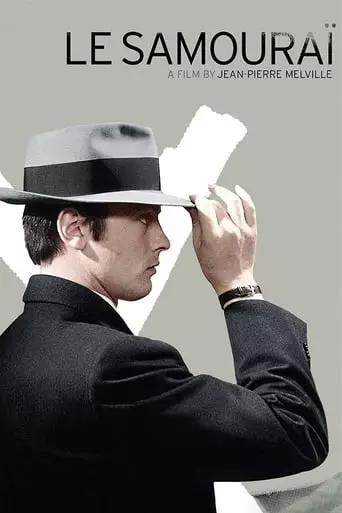After carrying out a flawlessly planned hit, Jef Costello, a contract killer with samurai instincts, finds himself caught between a persistent police investigator and a ruthless employer, and not even his armor of fedora and trench coat can protect him.
Le Samouraï is a 1967 French crime thriller directed by Jean-Pierre Melville, featuring Alain Delon as Jef Costello, a professional hitman operating in Paris. The film opens with Jef methodically preparing for and executing a contract killing, showcasing his meticulous nature and adherence to a personal code. After the murder, he is seen leaving the scene, leading to his identification by witnesses, including a nightclub pianist named Valérie. Despite his alibi, the police, led by Inspector Coleman, remain suspicious and intensify their surveillance. Jef’s struggle to maintain his honor and evade both the law and his employers unfolds with a sense of inevitability, reflecting the film’s existential themes.
Melville’s direction is characterized by minimalist storytelling, emphasizing silence and space. The film’s pacing is deliberate, allowing tension to build through visual cues and sparse dialogue. The cinematography by Henri Decaë captures the moody ambiance of Paris, utilizing shadows and urban landscapes to enhance the film’s noir aesthetic. The haunting jazz score by François de Roubaix complements the film’s atmosphere, underscoring its themes of isolation and existentialism. The film’s influence is evident in its impact on subsequent crime thrillers, inspiring directors with its stylized approach and exploration of the antihero archetype.
Main Themes in Le Samouraï
- Isolation and Solitude
Jef Costello embodies the archetype of the solitary assassin, operating alone and maintaining emotional detachment. His interactions are minimal, and he is depicted as a man apart from society, highlighting themes of loneliness and existential isolation. This solitude is both a personal choice and a consequence of his profession.
- Honor and Professionalism
Despite his criminal activities, Jef adheres to a strict personal code, reflecting a sense of honor and professionalism. His meticulous planning and execution of the hit demonstrate his commitment to his craft, and he operates with a sense of duty and discipline.
- Fate and Inevitability
The film explores the concept of fate, suggesting that Jef’s path is predestined. His actions seem to lead him toward an inevitable conclusion, and the narrative unfolds with a sense of fatalism, emphasizing the inescapable nature of his circumstances.
- Surveillance and Paranoia
Jef’s awareness of being watched by both the police and his employers introduces themes of surveillance and paranoia. The constant observation heightens the tension and underscores the precariousness of his existence, as he navigates a world where trust is scarce.
Impact of Le Samouraï
Upon its release, Le Samouraï received critical acclaim for its direction, cinematography, and the performance of Alain Delon. The film has since become a seminal work in the crime genre, influencing numerous filmmakers and being cited as a classic example of French noir cinema. Its minimalist style and exploration of existential themes have been particularly influential, inspiring a range of films that delve into the psyche of the antihero. The film’s enduring legacy is evident in its continued study and appreciation within cinematic circles.
7 Reasons to Watch Le Samouraï
- Masterful Direction by Jean-Pierre Melville
Melville’s expertise in the crime genre is evident in Le Samouraï. His minimalist style and focus on procedural detail create a tense and immersive viewing experience. The film’s deliberate pacing and atmospheric tension are hallmarks of his directorial prowess.
- Stellar Performance by Alain Delon
Alain Delon delivers a compelling performance as Jef Costello, bringing depth to the character’s complexity. His portrayal of a professional hitman grappling with his own code of honor and isolation is both nuanced and captivating.
- Innovative Cinematography
Henri Decaë’s cinematography captures the moody ambiance of Paris, utilizing shadows and urban landscapes to enhance the film’s noir aesthetic. The visual style complements the film’s themes of isolation and fate, immersing viewers in its atmospheric world.
- Exploration of Existential Themes
Le Samouraï delves into existential themes such as fate, isolation, and the human condition. The character’s introspective journey and moral dilemmas provide a thought-provoking narrative that resonates on a deeper level.
- Influential Noir Aesthetic
The film’s noir aesthetic, characterized by its use of shadows, urban settings, and morally ambiguous characters, has influenced numerous films in the genre. Its stylistic choices have become a template for subsequent crime dramas.
- Minimalist Storytelling
The film’s minimalist approach, with its sparse dialogue and deliberate pacing, allows for a more immersive experience. This style encourages viewers to engage more deeply with the narrative and the characters’ internal struggles.
- Cultural and Historical Significance
Le Samouraï holds a significant place in French cinema history, reflecting the cultural and social dynamics of the era. Its exploration of themes such as honor, betrayal, and fate offers insights into the human psyche and societal constructs.
How Will You Feel After Watching Le Samouraï?
After viewing Le Samouraï, you will likely experience a profound appreciation for the film’s meticulous craftsmanship and its exploration of complex themes. The film’s deliberate pacing and atmospheric tension may evoke a sense of contemplation and introspection. The character’s moral dilemmas and existential struggles will prompt reflection on the nature of fate, professionalism, and human connection. The film’s minimalist style and haunting ambiance will leave a lasting impression, immersing you in the world of crime, fate, and isolation. You may feel a sense of melancholy or solemnity, as the film’s exploration of existential themes and the harsh realities of the character’s life lingers long after the credits roll. The unresolved nature of the story, along with its subtle yet powerful depiction of human behavior under extreme circumstances, will likely leave you reflecting on the choices and sacrifices made by the character, making

